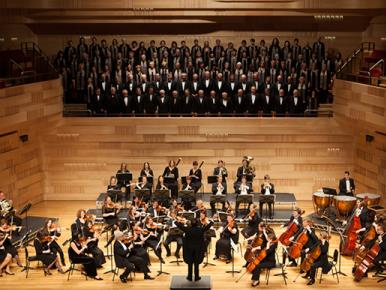The latest Willoughby Symphony Orchestra and choir concert under the umbrella title of ‘Inspired Beginnings’ is stirring, combining thunderous choir and rippling piano in a wonderful mix. Led by conductor Stephen Mould, this was a thrilling performance.
First up was the short Beethoven cantata in three movements, Calm Sea and Prosperous Voyage Op 112. It was powerful with dramatic strings and effective use of wind instruments. It was full of ravishing sound and the choir was exultant.
The main feature of the first half was the glorious Chopin piano concerto No 2 in F Minor Op 21. featuring solo pianist Brenda Jones. Jones, looking glamorous in a stunning sleeveless red dress, played exquisitely. It was Romantic, in the three movements typical of the period, and tempestuous, in places almost an argument between the orchestra and soloist.
Fast bravura passages were contrasted with lyrical , slower sections – at one point it seemed as if the piano was in tears. In the first movement Jones’ hands cascaded up and down the keyboard, rippling; fluttering like butterflies. The second movement revealed operatic influences (particularly of Bellini and Rossini) and the trembling strings in the middle section. The third ‘Mazurka’ movement was naturally very evocative of Fokine’s ‘Les Sylphides’ and yet there was a harsher, more brittle, jewel-like feel. Also in the third movement there was interesting, very effective use of horns and woodwind.
After interval came Merton’s ‘And the World Was Finally Right’, which recently won the 2013 Willoughby Symphony and Fine Music Young Composer Award. It is a short, shimmering explosively powerful and tempestuous piece, with hints of Sculthorpe’s works.
The final work was a little known Mendelssohn work ‘Die Erste Walpurgisnacht’ (The First Walpurgis Night ). Using the Goethe ballad as inspiration, in ten short sections, the piece is an excellent example of the Romanticism of the period in which it was written.
There were three magnificent soloist singers (Sarah Sweeting, Pascal Herrington and David Hidden) and turbulent, startling use of the choir with great tonal effects. The climax of the piece is the proud, defiant chorus of Druid worship. Herrington’s tenor was strong, bright and commanding, Hidden’s bass deep and inspiring. Herrington and Hidden were in formal tuxedos. Sweeting our soprano soloistwas also tremendous, her solo was melancholy and torn. The cantata closes with the druids singing a hymn of praise, led by their priests.
Running time 2 hours (approx) including one interval
Inspired Beginnings was at the Concourse , Chatswood 16, 17 November 2013
Beethoven Meerestille und Gluckliche Fahrt ( Calm sea and prosperous voyage) op 112
Chopin Piano Concerto No2 in F Minor op21
Meton And the World Was Finally Right 2013 Willoughby Symphony and Fine Music Young Composer Award
Mendelssohn Die erste Walpuurgisnacht ( The first Walpurgis night) op 60





